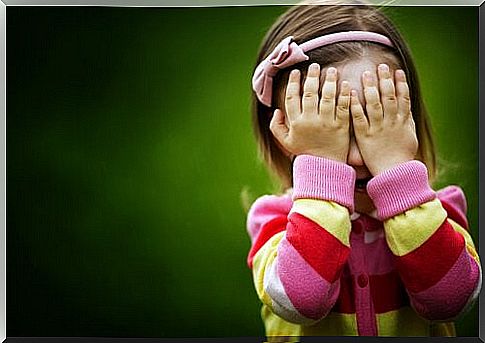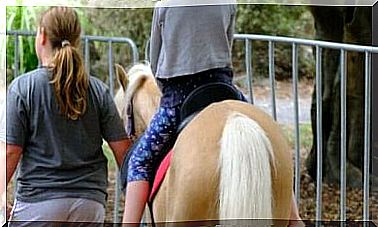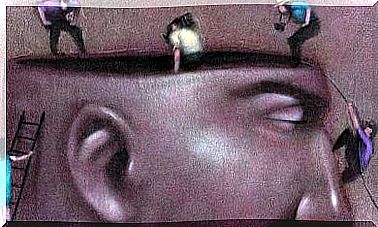7 Uncomfortable Feelings That Children Should Be Taught To Deal With

It is completely impossible to keep all uncomfortable feelings away. Adults cannot do that, nor should children. Even if we wanted to keep such feelings out of the vicinity so that no one would suffer from them, acting in this way would lead to just the opposite results.
Many parents try to protect their children from experiencing uncomfortable feelings. In the long run, however, this is not helpful. At some point in their lives, every child will have to face difficult situations anyway. They will face pain and frustration. Protecting them from this as a child only makes their adult lives more difficult.
We should not protect children from uncomfortable feelings, but instead teach them how they can deal with them in the right way. Children should learn how to cope with uncomfortable feelings in a healthy way.
How can we help children deal with uncomfortable feelings?
While this is not an easy task, we should teach children how they can deal with emotions such as pain and rage as this prepares them for life. Such uncomfortable feelings only become stronger and more intense as the child grows. Learning to encounter them at an early age promotes the child’s adjustment and growth process.
Teaching a child how to deal with emotions is the best way to prepare him or her to face the responsibilities and disappointments of adult life.
Teaching a child how to deal with boredom
Boredom is something that can affect anyone. However, children become more bored and then demand attention. However, this does not mean that an adult should solve a problem every time a child is bored. In addition, it is good for the child to be bored every now and then.
Boredom stimulates a child’s innate creativity. For this reason, we should encourage our children to come up with something to do for themselves instead of providing them with constant entertainment.
We should encourage children to face boredom and think positively about how they could solve this problem.
Teaching a child how to deal with frustration
It is a natural reaction that we want to help a child if he or she feels frustrated. However, the child should learn how to deal with this feeling independently and effectively. Someone isn’t always going to help them deal with that feeling, so they should learn to face frustrating situations on their own.
If a child has difficulty getting homework or a puzzle done, or if he or she is having trouble doing anything else like this, the solution is not for us to do it for him or her. This only makes them grow frustrated because they don’t learn to solve things themselves.
In such situations, the adult (teacher, parent, etc.) should talk to the child, reassure him or her, and encourage him or her to find a solution himself or herself. In this way, the child learns that in order to deal with a frustrating situation, he must first calm down.
If a child is not given the opportunity to solve their own problems on their own, they may begin to feel that they are unable to defend themselves. In other words, he will grow up feeling that someone else should always solve problems for him.
Teaching a child how to deal with grief
Grief is a feeling that is always present in our lives. It is normal for certain events or situations to cause grief. Children should learn to recognize grief and understand that it is a normal feeling and that everyone is sometimes sad.
The child should learn that everything that happens in life is not happy and fun. The child should experience grief naturally. This helps them to better accept themselves and their feelings. In Jose Ignacio Cordero’s book El peluquero de la División Azul (“Barber of the Blue Division”), the author tells, through one of his characters, that grief is not evil, but only that it is seen as evil.
Teaching a child how to deal with fear
It is not healthy if a child experiences constant fear. However, it is important that they are able to identify the fear and the kind of situations that cause them this uncomfortable feeling. This is the only way they can learn to deal with it.
They should also learn to face fear. They should learn that they are not forced to let this feeling prevent them from achieving their goal, whether it is asking for a new toy or getting a good number on the certificate.
When a child is scared, it is important that we help him or her understand that feeling and teach him or her how he or she can be funded. Sometimes we have to let them show their fears so we can teach them what they feel and how they can get over their fears. Suppressing such feelings does nothing to help.
Teaching a child how to deal with disappointment

Children experience disappointment often and for many reasons. Most of these reasons cannot be controlled. Maybe the child is lost in the game, can’t find their favorite candy in the store, or gets into a different group with their best friend. Maybe mom or dad comes home late and doesn’t have time to play today. The list could go on indefinitely.
Whatever the reason, disappointment is a feeling a child will feel throughout his or her life and one of those feelings he or she must learn to deal with. If he didn’t learn this, he thought every little disappointment would be almost the end of the world.
If a child is not allowed to feel feelings of disappointment or all the disappointments he or she experiences are somehow attempted to be compensated, he or she becomes sensitively impulsive or selfish.
Teaching a child how to deal with anger
Anger is not a bad feeling. It only becomes a bad thing when we can’t handle it. The child should learn to deal with anger and other similar feelings in a healthy way. It is neither healthy nor necessary to deal with feelings of anger in an aggressive way.
The child should be taught that by taking a deep breath and waiting a moment, the child can calm himself physically when he is angry. Counting to ten is a good strategy that works for both children and adults. In this case, the person can, as it were, take a step back and take control of the situation.
Teaching a child to deal with guilt
It is not possible for us to accept every excuse so that the child does not have to feel guilty. The child should learn the truth that his or her behavior affects other people and that an excuse or apology does not change this fact. We should not put them to shame because of their behavior but instead show them how they can feel responsible for their actions in a constructive and change-creating way.
If a child’s excuse is always accepted, he or she will never learn to recognize a sense of guilt or responsibility. A child will never learn that his actions can hurt other people.









